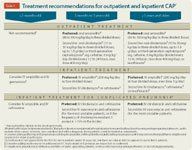Pediatric community-acquired pneumonia, Part 2: Challenges in the outpatient treatment
After navigating a diagnosis of community-acquired pneumonia, pediatricians' attention turns to treatment and management, which is guided by age and clinical factors.
The Case

Community-acquired pneumonia (CAP) causes a spectrum of illness in children, and remains a frequent cause for outpatient visits. While viruses can be identified in up to half of patients with CAP,1,2 distinguishing between viral and bacterial pneumonia can be exceedingly difficult.3 Therefore empiric antimicrobial therapy is often instituted. But which antibiotics will work best given your patient's age and degree of illness? How long should your patient take to improve symptomatically? And when should you consider hospitalization?
It is important to minimize the use of broad-spectrum antibiotics for CAP and the unintended sequelae of their overuse, such as increasing microbial resistance. That said, the following text outlines the most well-reasoned antimicrobial therapies for outpatient CAP.

In a randomized trial in a developing country, treatment with amoxicillin resulted in fewer failures than with trimethoprim-sulfamethoxazole (TMP-SMX). Amoxicillin was also shown to be more effective in patients less than 1 year of age, and among those with severe pneumonia (defined by cough or difficulty breathing with lower chest retractions).5 Notably, in the subset of patients with pneumococcal bacteremia, none failed amoxicillin treatment, whereas almost 30% failed treatment with TMP-SMX. A subsequent randomized trial comparing amoxicillin to TMP-SMX, however, did not show any statistical difference in treatment failures for non-severe CAP.6
While there had been an increase in reports of in vitro beta-lactam (ie, amoxicillin or ampicillin) resistance among S pneumoniae isolates, there has not been a significant increase in clinical failures for patients treated with these antibiotics. These findings reinforce the use of amoxicillin (or ampicillin) as a first-line treatment for pediatric CAP.7-9 Additionally, the rate of antibiotic-resistant pneumococci has decreased with the introduction of the heptavalent pneumococcal conjugate vaccine (PCV7).10